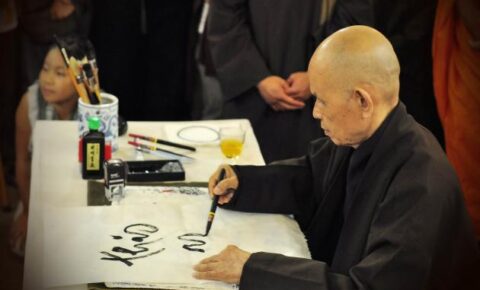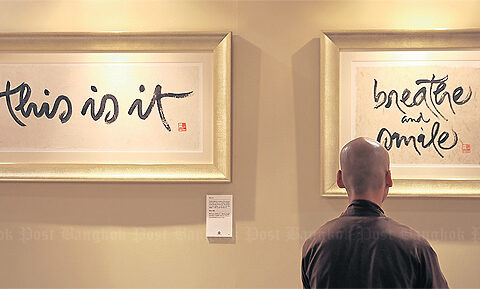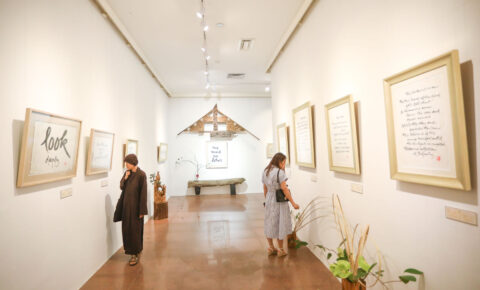 A Brush with Enlightenment
A Brush with Enlightenment
Zen master Thich Nhat Hanh demonstrates his art of meditation through calligraphy
by Karnjariya Sukrung | 8 Apr 2013
Amid an enthusiastic crowd at Bangkok Art and Culture Centre, the subject of attention remained poised and calm, heightening his audience’s attention, concentration and awareness as he prepared to begin his activity.

Thich Nhat Hanh is now in Bangkok for various spiritual-related activities.
World-renowned Vietnamese Zen master Thich Nhat Hanh mixed tea with Chinese ink, picked up the brush and demonstrated his art of meditation through calligraphy.
Effortlessly, the 87-year-old master executed slow, steady strokes. His body was still, yet his hand flowed naturally, a conduit of his insights.
This is it. Peace is possible. Breathe and smile.
Short and simple, profound and powerful, phrases such as these have become Thich Nhat Hanh’s signature statements that encompass core Buddhist teachings and remind practitioners of mindful practice.
“Writing calligraphy is a practice of meditation,” said the poet, writer and peace activist who is famous for his teachings on applied Buddhism in everyday life. “The way I do calligraphy, I do it in a certain way that can generate the energy of mindfulness, concentration, insight and compassion during the time of practice.”
Held for the first time in Thailand, the exhibition “Calligraphic Meditation: The Mindful Art of Thich Nhat Hanh” presents the largest collection of the Zen master’s calligraphy to date.
“When I begin to draw a circle, I will breathe in during the time I do the first half of the circle. When I do the second half of the circle, I breathe out,” said the master.
“During the time I draw the circle, I realise too that this hand of mine contains the hands of my father, mother and ancestors. So my father, mother, ancestors and teachers are doing the circle with me. And since we are doing the circle together, there is no self, no separate self. So drawing a circle, you can get an insight of anatta or no-self.”

It is such power of meditation and insights that makes Thich Nhat Hanh’s calligraphic art distinctive and much sought-after across the world.
“People love to invite Thay’s [teacher] energy home. His calligraphy embodies the energy he generates; understanding, compassion and mindfulness,” said Brother Phap Niem from Plum Village International Sangha.
Some art critics have dubbed his work “choreographic calligraphy” which exudes exquisite qualities that incorporate straight and solid lines as well as flowing curves in a balanced composition.
However, the Zen master began his calligraphic expression in 1994 simply as a tool to nourish his students in the art of mindful living.
“I remember a calligraphic piece, Peace is every step, being put on a staircase,” said Sister Dinh Nghiem. “That helped me a lot with practicing.”
Here and there in the monasteries of the Plum Village centres across the world, Thich Nhat Hahn’s calligraphic works can be found in meditation halls, dining halls, staircases and bookshops.
To date, it is estimated that the Zen master has penned more than 10,000 calligraphic works. These have become sources of donations that have contributed to humanitarian projects in developing countries.
Among his most popular calligraphic pieces are Breathe, you are alive, This is it, Be beautiful, be yourself, and I have arrived, I am home.
Every piece of calligraphy serves as a topic of meditation, said Thich Nhat Hanh. Take for instance Be beautiful, be yourself. The master elaborated: “In order to be beautiful, you have to be yourself, you don’t need to be someone else. Be yourself like a lotus, she is beautiful by herself, she does not have to transform herself into a rose or another flower. There is a seed of joy, love, happiness in you. If you allow these seeds to manifest, you are a beautiful flower in a garden of humanity.”
Regarding the calligraphy Let go and be happy, he explained: “Let go of your craving, anger; and even let go of your idea of happiness. Everyone of us has an idea of how to be happy. We need to have this or that in order to be happy. You may not know that that idea of happiness may be the very obstacle to your happiness. If we have the courage to let go, happiness will come right away.”
Master Thich Nhat Hanh advised viewers to observe noble silence and mindful awareness when visiting the exhibition.
“Breathe in mindfully and bring your mind to your body. When you are truly there, you can allow the calligraphy to penetrate into your heart,” he said.
“In the depth of our consciousness, there is a seed of understanding, a seed of compassion, a seed of joy, a seed of insight, a seed of enlightenment. If we allow the calligraphy to touch the seed of insight in us, we may get the enlightenment that we need.
“So when you walk slowly through the calligraphy, and allow the calligraphy to touch us and water the good seeds inside us, we can get the transformation and healing during the time of walking and contemplating.
“Half an hour spent in the exhibition hall is half an hour of meditation. You can come out of the exhibition hall as a new person.”
This article appears on the Bangkok Post website © Post Publishing PCL. All rights reserved.





Share Your Reflections